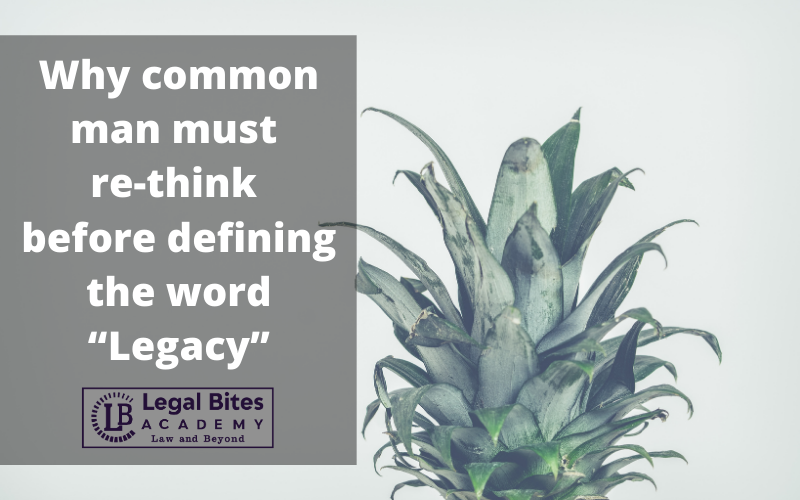Why common man must re-think before defining the word “Legacy”
The theme of the article ‘Why common man must re-think before defining the word “Legacy”’ is structured upon why man must think beyond saving monetary assets and property wealth for future generations and Acknowledge the need for conserving the Environment, Ecology, and its resources. It revolves around Indian environmental jurisprudence, Legislature, and Judiciary through International Institutions acknowledge the… Read More »

The theme of the article ‘Why common man must re-think before defining the word “Legacy”’ is structured upon why man must think beyond saving monetary assets and property wealth for future generations and Acknowledge the need for conserving the Environment, Ecology, and its resources.
It revolves around Indian environmental jurisprudence, Legislature, and Judiciary through International Institutions acknowledge the principle of Intergeneration equity and gives insight to why it is necessary for the realization to evolve from a common man to conserve natural resources for future use.
Why common man must re-think before defining the word “Legacy”
India is certainly divided due to its class structure yet there is one popular similarity. The idea and desperation for saving monetary gains and property assets for our future generation. Perhaps, it is the ideal time to re-think if securing the afore-mentioned assets shall alone fulfill your obligations. If yes, I’m sorry we ought to remedy our ignorance.
Destruction of Mankind and the environment cannot be an overnight phenomenon, unlike what movies depict. It is a gradual process that will impact beyond repair before we realize its outcome. The sorry state of affairs is, either our realization is taking the time or we are least bothered to realize the failure in protecting the environment.
The International legal instruments like Stockholm and Rio declaration indeed acted as a catalyst in acknowledging the need to ensure conservation and preservation of the environment for future generations. India was overwhelmed to incorporate the same in its Indian environmental jurisprudence. The commendable work of the Indian judiciary with its sound precedents showcases the appetite for conservation and protection of the environment.
Special mention also goes to the scholarly works of Edith Brown Weiss and her contribution to the concept of planetary trust. She clearly emphasized the need for every generation to protect the environment and she further underlines why it is not merely a moral or legal obligation but instead a duty of mankind to uphold and carry forward the resources and environmental wealth for the generations to come.
Aren’t we alerted enough? From the global media houses and international institutions about the melting of ice in the Antarctic Peninsula and the impact of Uttarakhand cloud burst incidents. They don’t just carry a sensation in themselves. Those are the warning about the ultimatum of catastrophic ends to which the world is marching forward.
When we sit Infront of TV sets or get informed about such incidents through our daily newspaper. Do we address these issues within ourselves? Perhaps, not. We must be thinking we are far away from the place of impact and this shall not concern us at least for a brief period of time. But the reality is we cannot predict the timeline of a natural calamity. When we are subjected to such events, we shall have the potential to repair neither this earth nor ourselves and our family.
Man-kind is self-scented and yes, we must accept this undisputed fact. We thrive to protect ecology not for ensuring maintenance of environmental health but merely to save our daily life and future generations from resource shortage.
Fatefully, the most distressing truth is we are neither achieving intra-generational equity nor marching forward towards aiming at inter-generational equity. We must be wondering how and why are we duty-bound to protect the ecology and its resources if government agencies are already doing their job.
It is the quintessential to bear in mind that the government agencies are also controlled by a common man. A sound government, effective legislation nor the judiciary can protect the environment in isolation. The obligation must start from its grass root level. Environmental impact, unlike the common man, does not know the hierarchy of people. It impacts everyone irrespective of their status, class, or power.
We as a society live within the intangible boundaries of customs and traditional ambit. We make god accountable for natural calamities. Ironically law also terms any natural hazard, which is not within the control of humans as an “Act of God”. However, the reality is we are our own reason for destruction or the luxury we attain from the use of natural resources. We are reciprocated with what we contribute to the environment and ecological balance.
Our contribution as small as a mustard seed shall help protecting our present generation and definitely our future generations. We narrowed down the definition of legacy. We often associate legacy with monetary assets and property wealth that we carry forward for generations to come. We ought to realize the fact that unless we carry forward the environmental wealth and natural resources in their rightful state. We won’t be in a position to cherish and enjoy other forms of the legacy that we inherited from the past.
Interpreting the provisions of the environmental Legislations or explaining the principles laid down by international institutions cannot always help us in realizing the need and the requirement for marching towards a sustainable environment. Realization must flow from “common man’s common sense”. We are accountable for what nature unfolds. Let us acknowledge, realize and try remedying the impact to protect the present generation and parallelly achieve inter-generational equity.
By – Kaarvannan. B
Advocate – High Court of Madras
Currently pursuing Masters at Tamil Nadu National Law University Batch 2020-2021


